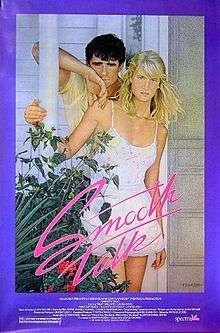Smooth Talk
| Smooth Talk | |
|---|---|
 Theatrical release poster | |
| Directed by | Joyce Chopra |
| Produced by | Martin Rosen |
| Written by |
Tom Cole (screenplay) Joyce Carol Oates (original short story) |
| Starring | |
| Music by |
Russ Kunkel Bill Payne |
| Cinematography | James Glennon |
| Edited by | Patrick Dodd |
| Distributed by |
American Playhouse Goldcrest Films |
Release dates | September 10, 1985 |
Running time | 96 minutes |
| Country | United States |
| Language | English |
| Box office | $16,785[1] |
Smooth Talk is a 1985 drama film, loosely based on Joyce Carol Oates' 1966 short story Where Are You Going, Where Have You Been?, which was in turn inspired by the Tucson murders committed by Charles Schmid. The protagonist and main character, Connie Wyatt, is played by Laura Dern. The antagonist, Arnold Friend, is played by Treat Williams.
The film was produced by American Playhouse and Goldcrest Films, and originally released to movie theaters in 1985. The original music score was composed by Russ Kunkel and Bill Payne. The movie won the Grand Jury Prize in the Dramatic category at that year's Sundance Festival.
Synopsis
Connie Wyatt is a restless 15-year-old who is anxious to explore the pleasures of her sexual awakening. Before she enters her sophomore year in high school, she spends the summer moping around her family farm house. She suffers from her mother's put-downs, while hearing nothing but praise for her older sister, June. Her father somehow manages to float around the family tensions. She also helps paint the cottage, just as her mother constantly demands her to.
Connie passes the time cruising the local shopping mall with her friends and flirting with boys. When an actual date leads to heavy petting, however, she flees from his car. At a hamburger joint, an older man confides to her, "I'm watching you!" and proves it soon after. One afternoon, her mother and June warn Connie to be careful with her flirting, and she is left alone in the house, while her family goes to a barbecue.
Later, as Connie is playing around the house, a man who calls himself Arnold Friend approaches her in a 1960s convertible with that name painted on it and identifies himself as "A. Friend". He dresses and acts like James Dean, and name-drops several teenybopper acts, even though he is much older than she is. He comes off very kind and friendly, but a bit suspicious, alternating between talking to her in a warm, seductive voice and shouting insults to his fellow car passenger when he asks Arnold if he should "pull out the phone," possibly to keep her from calling the police. Arnold tells Connie about how he has been watching her and that he knows all about her, recounting the details about her family's barbecue plans with amazing accuracy. He then starts talking about how he could be her lover. She starts to get scared and tells him to go, but he coerces her into going with him, threatening to burn down the house, while his friend remains in the house.
When she returns home, Connie is bewildered and disheveled, but tells Arnold that she never wants to see him again. It is left ambiguous whether or not he raped her; it is implied that she isn't the same person we met at the beginning of the film. After her family returns home, her mother tearfully apologizes to her for slapping her, but Connie reassures her that everything is all right. At the end of the film, she never tells June about what happened, but dances with her to James Taylor's recording of the song "Handy Man."
References
External links
| Awards | ||
|---|---|---|
| Preceded by Blood Simple |
Sundance Grand Jury Prize: U.S. Dramatic 1986 |
Succeeded by Waiting for the Moon |
| ||||||